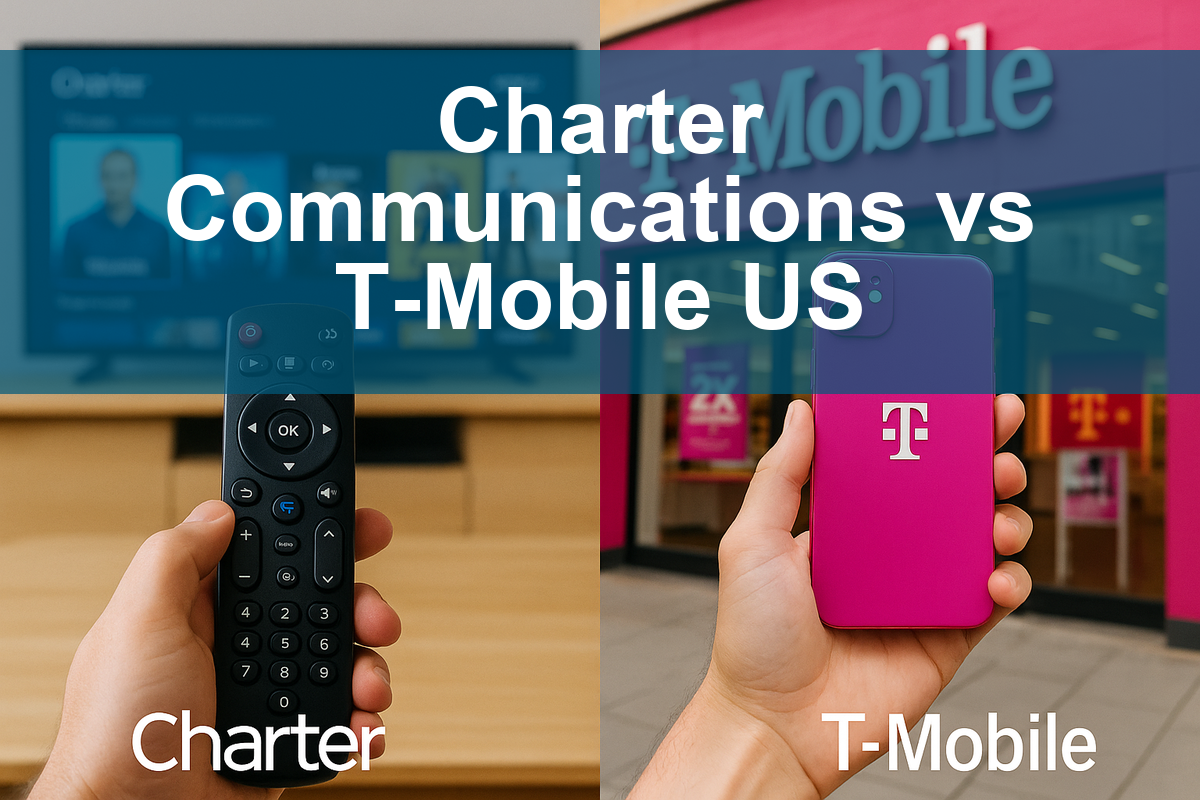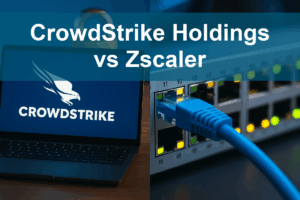In the dynamic world of telecommunications, two giants stand out: Charter Communications, Inc. (CHTR) and T-Mobile US, Inc. (TMUS). Both companies operate within the same industry, providing vital connectivity services to millions of customers across the United States. However, they diverge in their approach to innovation and market strategy—Charter focuses on broadband and video services, while T-Mobile emphasizes mobile communication. As we delve deeper into this comparison, I aim to uncover which of these companies presents the most compelling investment opportunity for you.

Table of contents
Company Overview
Charter Communications, Inc. Overview
Charter Communications, Inc. (CHTR) is a leading broadband connectivity and cable operator in the United States, serving around 32 million customers across 41 states. The company’s mission is to provide high-quality video, internet, and voice services to both residential and commercial clients. With a diverse range of offerings, including advanced video on demand, security solutions, and managed services, Charter aims to enhance connectivity and entertainment experiences. Headquartered in Stamford, Connecticut, Charter operates with a strong focus on innovation, striving to meet the evolving needs of its customer base.
T-Mobile US, Inc. Overview
T-Mobile US, Inc. (TMUS) is a prominent mobile communications provider in the United States, Puerto Rico, and the U.S. Virgin Islands, serving approximately 108.7 million customers. The company’s mission is to deliver superior voice, messaging, and data services, alongside a vast array of wireless devices, including smartphones and wearables. Headquartered in Bellevue, Washington, T-Mobile emphasizes customer-centric strategies and aims to lead the market in service innovation and competitive pricing, thereby enhancing user satisfaction and engagement.
Key Similarities and Differences
Both Charter and T-Mobile operate within the telecommunications services sector, focusing on providing connectivity solutions. However, Charter specializes in broadband and cable services, while T-Mobile primarily offers mobile communications. This distinction in their core offerings highlights their differing approaches to customer engagement and market positioning.
Income Statement Comparison
The following table presents a comparative analysis of the latest income statements for Charter Communications, Inc. (CHTR) and T-Mobile US, Inc. (TMUS), showcasing key financial metrics from the year ending December 31, 2024.
| Metric | CHTR | TMUS |
|---|---|---|
| Revenue | 55.1B | 81.4B |
| EBITDA | 21.4B | 31.0B |
| EBIT | 12.7B | 18.1B |
| Net Income | 5.1B | 11.3B |
| EPS | 35.53 | 9.70 |
Interpretation of Income Statement
In 2024, CHTR experienced a slight increase in revenue to 55.1B, while TMUS saw a more substantial rise to 81.4B. CHTR’s net income increased to 5.1B, reflecting stable margins, whereas TMUS’s net income of 11.3B suggests robust growth. Both companies maintained healthy EBITDA margins, with CHTR at 38.8% and TMUS at 38.1%. Overall, TMUS demonstrated stronger growth dynamics than CHTR, which indicates a need for CHTR to enhance its revenue growth strategies in a competitive market.
Financial Ratios Comparison
In this section, I present a comparative table of recent financial ratios for Charter Communications, Inc. (CHTR) and T-Mobile US, Inc. (TMUS). This analysis will help you evaluate their financial health and performance.
| Metric | CHTR | TMUS |
|---|---|---|
| ROE | 32.61% | 18.37% |
| ROIC | 7.43% | 7.05% |
| P/E | 9.65 | 22.76 |
| P/B | 3.15 | 4.18 |
| Current Ratio | 0.31 | 0.91 |
| Quick Ratio | 0.31 | 0.83 |
| D/E | 6.14 | 1.85 |
| Debt-to-Assets | 63.83% | 54.99% |
| Interest Coverage | 2.53 | 5.28 |
| Asset Turnover | 0.37 | 0.39 |
| Fixed Asset Turnover | 1.28 | 1.21 |
| Payout Ratio | 0% | 29.10% |
| Dividend Yield | 0% | 1.28% |
Interpretation of Financial Ratios
Charter Communications (CHTR) exhibits a high return on equity (ROE) of 32.61%, indicating strong profitability relative to shareholders’ equity, while T-Mobile (TMUS) has a lower ROE of 18.37%. However, CHTR’s high debt-to-equity ratio (6.14) raises concerns about financial leverage and risk. TMUS maintains a healthier current ratio (0.91) compared to CHTR (0.31), indicating better short-term liquidity. Overall, while CHTR shows superior profitability metrics, its significant debt levels warrant caution for potential investors.
Dividend and Shareholder Returns
Charter Communications (CHTR) does not pay dividends, focusing instead on reinvesting in growth and technology. This strategy aligns with its high capital expenditure and acquisition needs, which may enhance long-term shareholder value. Conversely, T-Mobile US (TMUS) offers a modest dividend yield of 1.28% with a payout ratio of 29.1%, supported by solid cash flow. The presence of share buyback programs in both companies highlights a commitment to returning value to shareholders, though CHTR’s lack of dividends suggests a different approach to value creation.
Strategic Positioning
In the competitive telecommunications market, T-Mobile US, Inc. (TMUS) holds a significant market share, serving approximately 108.7M customers, while Charter Communications, Inc. (CHTR) caters to around 32M customers. TMUS benefits from a lower beta (0.44), indicating less volatility compared to CHTR (1.05). Both companies face competitive pressure from each other and emerging technologies, necessitating ongoing innovation to maintain their positions. As the industry evolves, the risk of technological disruption remains a critical factor for investors to consider.
Stock Comparison
In this section, I will analyze the weekly stock price movements of Charter Communications, Inc. (CHTR) and T-Mobile US, Inc. (TMUS) over the past year, highlighting key price dynamics and trading behaviors.

Trend Analysis
Charter Communications, Inc. (CHTR)
- Percentage Change: Over the past year, CHTR has experienced a significant price decline of -49.8%.
- Trend Direction: This indicates a bearish trend.
- Volatility: The stock shows considerable volatility with a standard deviation of 53.13.
- Notable Highs and Lows: The highest price recorded is 427.25, while the lowest is 195.13.
- Acceleration Status: The trend is in a state of deceleration, with a recent price change of -25.38% from September 7, 2025, to November 23, 2025.
T-Mobile US, Inc. (TMUS)
- Percentage Change: TMUS has shown a positive price change of 31.71% over the past year.
- Trend Direction: This suggests a bullish trend.
- Volatility: The stock has a standard deviation of 34.57, indicating moderate volatility.
- Notable Highs and Lows: The highest price achieved is 270.82, while the lowest is 160.05.
- Acceleration Status: The recent trend shows deceleration, with a decline of -16.45% from September 7, 2025, to November 23, 2025.
In summary, CHTR’s bearish trend and significant volatility contrast with TMUS’s bullish performance, though both stocks exhibit signs of deceleration in their recent price movements. This analysis underscores the differing dynamics within these two companies, which may influence your investment decisions.
Analyst Opinions
Recent analyst recommendations indicate a mixed sentiment towards Charter Communications, Inc. (CHTR) and T-Mobile US, Inc. (TMUS). CHTR has received an “A-” rating, with analysts praising its strong return on equity and assets, suggesting a “buy” consensus. Conversely, TMUS holds a “B” rating, with concerns regarding its discounted cash flow and price-to-book metrics, leading to a more cautious “hold” recommendation. Overall, I believe the consensus for CHTR is a buy, while TMUS leans towards holding.
Stock Grades
In the ever-evolving landscape of trading, it’s essential to keep an eye on stock ratings provided by reputable grading firms. Here’s an overview of the latest grades for Charter Communications, Inc. and T-Mobile US, Inc.
Charter Communications, Inc. Grades
| Grading Company | Action | New Grade | Date |
|---|---|---|---|
| Barclays | maintain | Underweight | 2025-11-03 |
| Benchmark | maintain | Buy | 2025-11-03 |
| Bernstein | downgrade | Market Perform | 2025-11-03 |
| Wells Fargo | maintain | Equal Weight | 2025-11-03 |
| Keybanc | downgrade | Sector Weight | 2025-11-03 |
| Citigroup | maintain | Buy | 2025-11-03 |
| RBC Capital | maintain | Sector Perform | 2025-11-03 |
| Keybanc | maintain | Overweight | 2025-10-03 |
| B of A Securities | maintain | Buy | 2025-09-24 |
| Bernstein | maintain | Outperform | 2025-09-10 |
T-Mobile US, Inc. Grades
| Grading Company | Action | New Grade | Date |
|---|---|---|---|
| Tigress Financial | maintain | Buy | 2025-11-11 |
| Morgan Stanley | maintain | Overweight | 2025-10-27 |
| Barclays | maintain | Overweight | 2025-10-24 |
| TD Cowen | maintain | Buy | 2025-10-24 |
| Wells Fargo | upgrade | Overweight | 2025-10-16 |
| RBC Capital | upgrade | Outperform | 2025-10-14 |
| Benchmark | maintain | Buy | 2025-10-10 |
| Scotiabank | maintain | Sector Outperform | 2025-10-06 |
| JP Morgan | maintain | Overweight | 2025-09-30 |
| RBC Capital | maintain | Sector Perform | 2025-07-25 |
Overall, Charter Communications has seen a mix of downgrades and maintained ratings, indicating a cautious outlook from some analysts. Conversely, T-Mobile US continues to receive favorable reviews, with a trend of maintaining or upgrading ratings, reflecting strong market confidence in its performance.
Target Prices
The following table presents the reliable target price data for Charter Communications, Inc. (CHTR) and T-Mobile US, Inc. (TMUS) based on recent analyst consensus.
| Company | Target High | Target Low | Consensus |
|---|---|---|---|
| Charter Communications | 500 | 200 | 326.6 |
| T-Mobile US | 310 | 263 | 281.71 |
For Charter Communications, analysts expect a target consensus of 326.6, significantly higher than its current price of 195.03. T-Mobile US has a consensus target of 281.71, compared to its current price of 211.31, suggesting potential upside for investors in both companies.
Strengths and Weaknesses
The following table summarizes the strengths and weaknesses of Charter Communications, Inc. (CHTR) and T-Mobile US, Inc. (TMUS) based on the most recent data.
| Criterion | Charter Communications (CHTR) | T-Mobile US (TMUS) |
|---|---|---|
| Diversification | Limited, focused on broadband and cable services | Broad, including mobile, broadband, and various services |
| Profitability | Net profit margin: 9.23% | Net profit margin: 13.93% |
| Innovation | Moderate investment in technology | High investment in 5G and new technologies |
| Global presence | Primarily US-based | US, Puerto Rico, and Virgin Islands |
| Market Share | Approximately 32M customers | Around 108.7M customers |
| Debt level | High debt-to-equity ratio: 6.14 | Moderate debt-to-equity ratio: 1.85 |
Key takeaways indicate that while CHTR is heavily focused on broadband and cable services with a significant debt burden, TMUS exhibits a broader service offering and stronger profitability, making it potentially more resilient in the current market.
Risk Analysis
The table below outlines the various risks associated with two major players in the telecommunications sector, Charter Communications (CHTR) and T-Mobile US (TMUS).
| Metric | Charter Communications (CHTR) | T-Mobile US (TMUS) |
|---|---|---|
| Market Risk | Medium | High |
| Regulatory Risk | High | Medium |
| Operational Risk | Medium | Medium |
| Environmental Risk | Low | Medium |
| Geopolitical Risk | Medium | High |
In analyzing the risks, T-Mobile faces higher market and geopolitical risks due to its extensive competitive landscape and international exposure. Charter, while more stable, contends with significant regulatory challenges that could impact its operations and profitability.
Which one to choose?
When comparing Charter Communications, Inc. (CHTR) and T-Mobile US, Inc. (TMUS), CHTR shows a strong financial foundation with a higher gross profit margin of 46% versus TMUS’s 63%. However, TMUS exhibits better overall growth, with a bullish stock trend and a price increase of 31.71% over the past year, compared to CHTR’s bearish trend and a decrease of 49.8%. Analysts rate CHTR with an A- due to solid returns, while TMUS has a B rating, indicating some concerns regarding valuation.
For growth-focused investors, TMUS may be more appealing, while those prioritizing stability and strong financial metrics may lean towards CHTR. Both companies face risks related to competition and market dependence, which could impact future performance.
Disclaimer: This article is not financial advice. Each investor is responsible for their own investment decisions.
Go further
I encourage you to read the complete analyses of Charter Communications, Inc. and T-Mobile US, Inc. to enhance your investment decisions:



